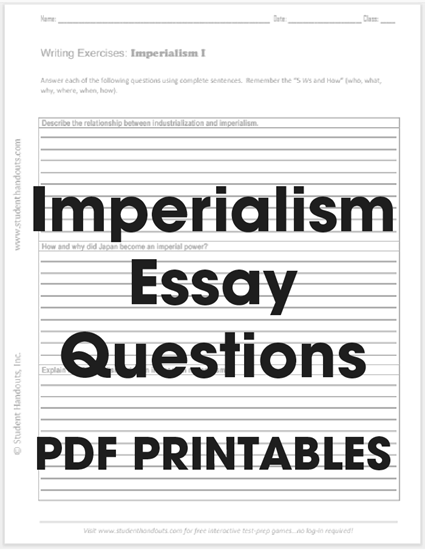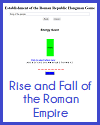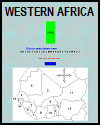| Imperialism Essay Questions PDF |
|---|
| www.studenthandouts.com ↣ World History ↣ Imperialism ↣ Imperialism Worksheets |
 |
    |
|
Handout #1 - Click here to print. Answers will vary. (1) Describe the relationship between industrialization and imperialism. Industrialization and imperialism were closely linked in the 19th century. Industrialized nations needed raw materials, new markets, and cheap labor to fuel their growing economies. Imperialism allowed them to acquire colonies that provided these resources. In turn, imperial powers used their advanced technology, such as steamships and weapons, to dominate and control other regions. Industrialization thus drove and enabled imperial expansion across the globe. (2) How and why did Japan become an imperial power? Japan became an imperial power in the late 19th and early 20th centuries after rapidly modernizing during the Meiji Restoration. Seeking to compete with Western powers, Japan industrialized its economy, built a strong military, and pursued territorial expansion. Victories in the Sino-Japanese and Russo-Japanese Wars allowed Japan to gain control over Korea, Taiwan, and parts of China, securing resources and strategic influence in East Asia. (3) Explain how imperialism led to an increase in nationalism. Imperialism often fueled nationalism by sparking pride in a country's global power and territorial expansion. As empires grew, citizens felt a stronger national identity tied to their nation's dominance. At the same time, people in colonized regions developed nationalist movements in response to foreign rule, seeking independence and self-determination. Thus, imperialism intensified both patriotic feelings in imperial powers and resistance-based nationalism in colonized populations. Handout #2 - Click here to print. Answers will vary. (1) Describe the "Scramble for Africa." The "Scramble for Africa" refers to the rapid colonization and division of African territory by European powers during the late 19th century, especially after the Berlin Conference of 1884-1885. Motivated by economic interests, national rivalry, and a desire for global influence, countries like Britain, France, Germany, and Belgium claimed vast areas. This period drastically reshaped Africa's political landscape, often ignoring existing cultures and borders, and led to lasting consequences for the continent. (2) What was decided at the Congress of Berlin? The Congress of Berlin, held in 1884-1885, was a meeting of European powers to regulate the colonization and trade in Africa during the "Scramble for Africa." Led by German Chancellor Otto von Bismarck, the conference established rules for claiming African territories, emphasizing effective occupation. It aimed to prevent conflict among European nations but excluded African representatives entirely, leading to arbitrary borders that disrupted ethnic and cultural groups across the continent. (3) Explain the role of Cecil Rhodes in the European settlement of southern Africa. Cecil Rhodes played a key role in the European settlement of southern Africa during the late 19th century. A wealthy British businessman and imperialist, he expanded British control through his company, De Beers, and helped colonize territories later named Rhodesia (now Zimbabwe and Zambia). As Prime Minister of the Cape Colony, he promoted British dominance and supported policies that marginalized indigenous peoples, fueling imperial expansion in the region. |
| Imperialism Books and Films | Imperialism Outlines and PowerPoints |
| Imperialism Maps and Pictures | Imperialism Study Games |
| Imperialism Miscellany | Imperialism Worksheets |
| www.studenthandouts.com ↣ World History ↣ Imperialism ↣ Imperialism Worksheets |














































